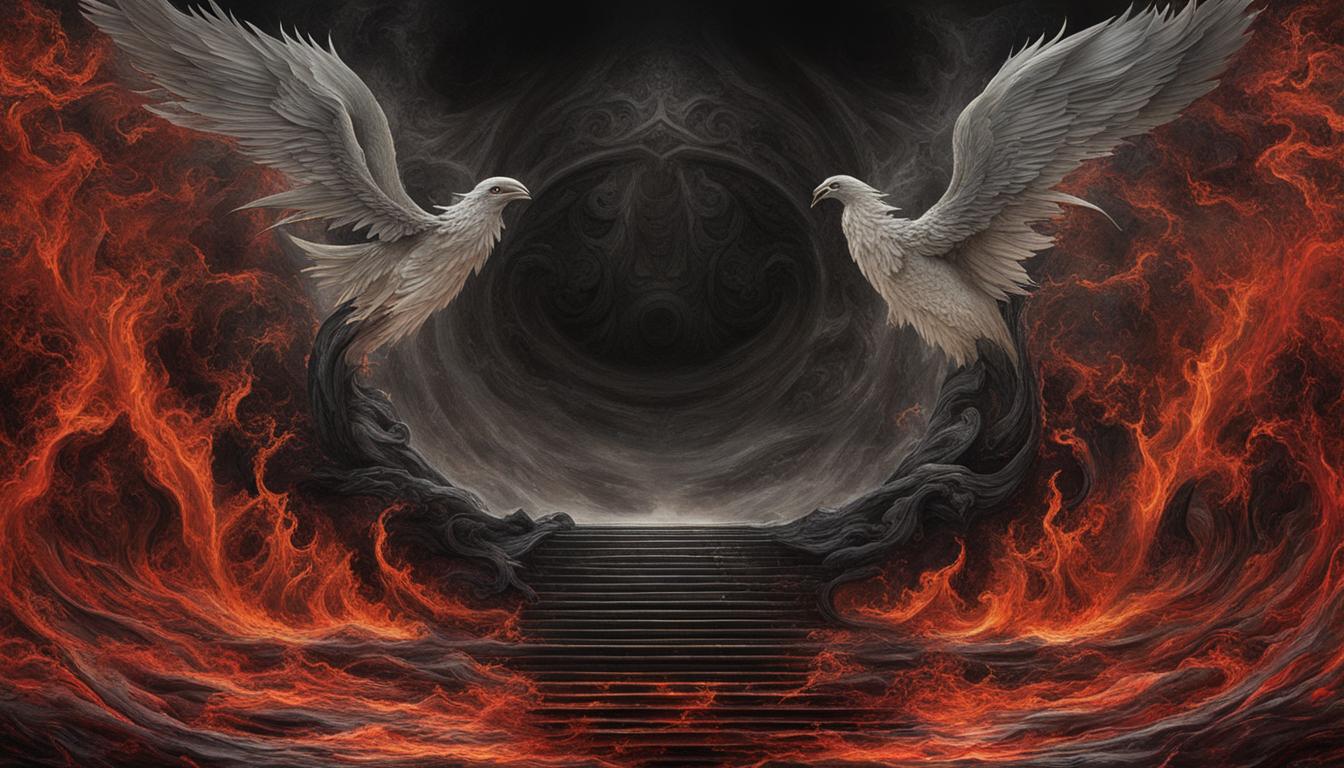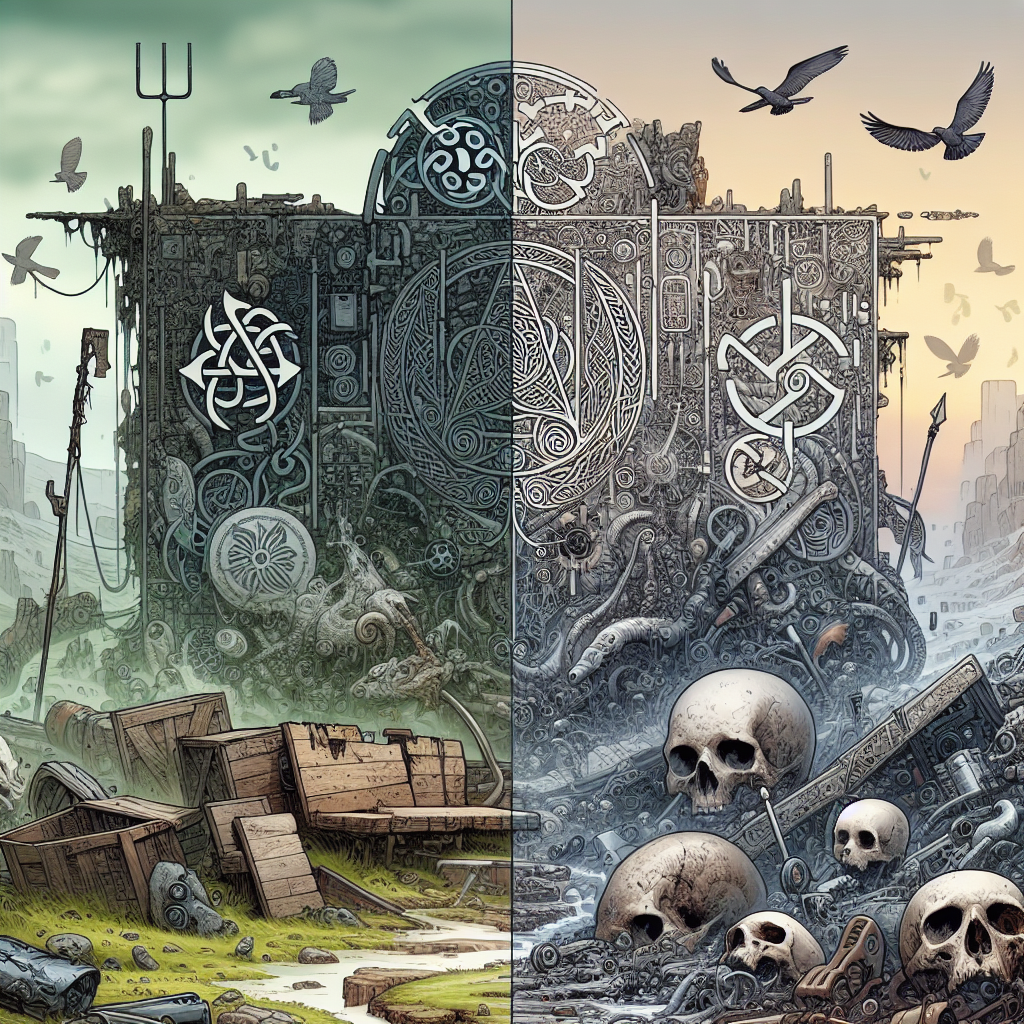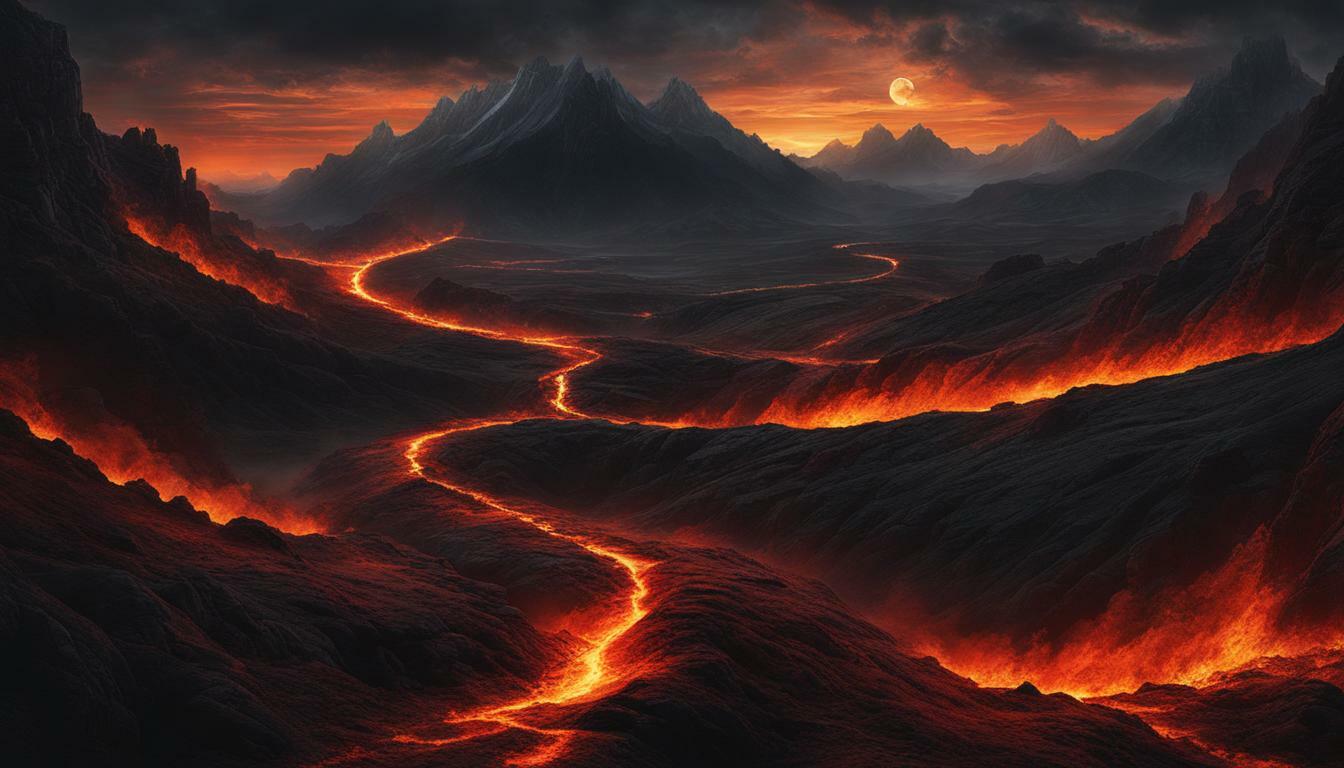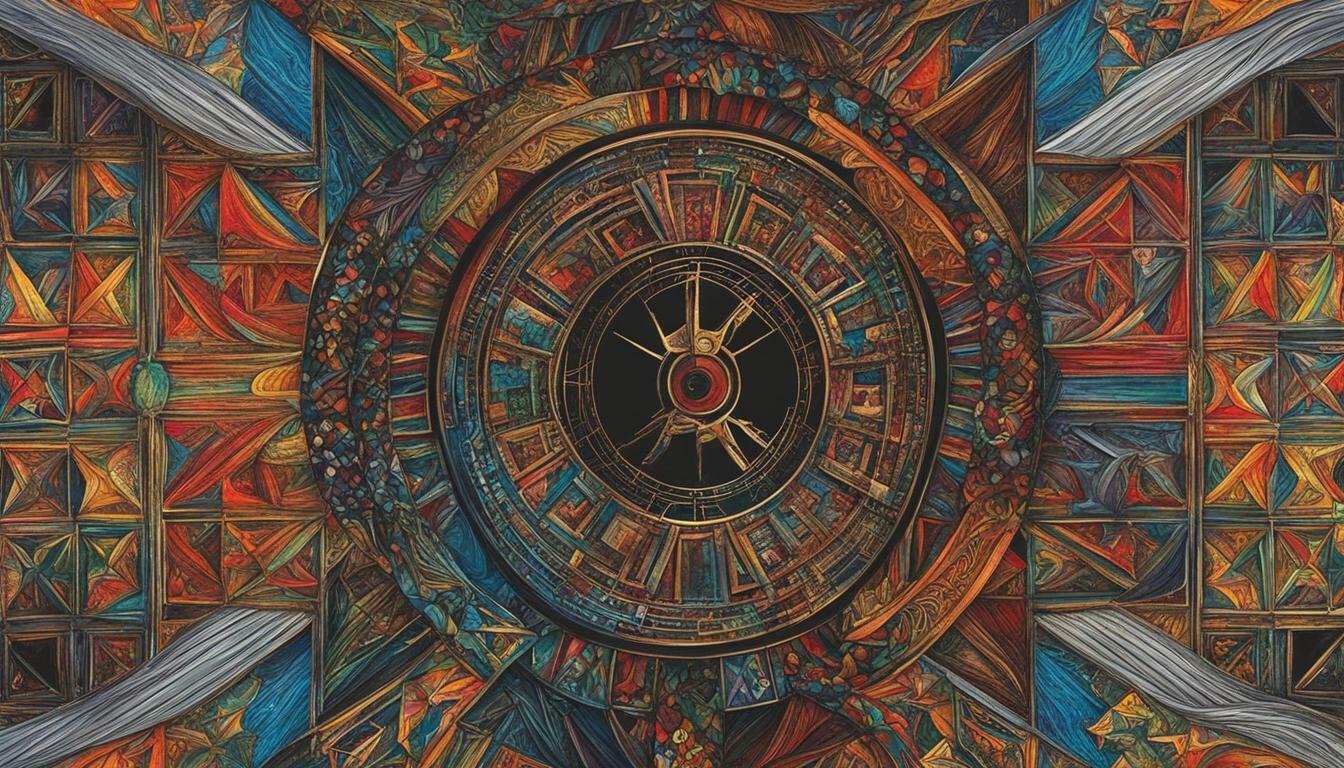Paradise Lost and Divine Comedy are two epic narratives that explore the concept of Hell in unique ways. While Paradise Lost, written by John Milton, focuses on the biblical story of creation and the fall of Adam and Eve, Dante’s Divine Comedy delves into a journey through the various circles of Hell. Despite their differences in plot and structure, both works offer fascinating insights into the underworld and its themes.
Key Takeaways:
- Paradise Lost and Divine Comedy approach the concept of Hell differently, with Paradise Lost focusing on the biblical narrative and Divine Comedy presenting a personal journey through the circles of Hell.
- Both works explore themes of sin, punishment, and redemption within the context of Hell.
- Paradise Lost offers a grand narrative that explores theological themes, while Divine Comedy delves into the individual experiences of the protagonist.
- Despite their differences, both works contribute to our understanding of the underworld and its significance within literature and theology.
Overview of Paradise Lost
Paradise Lost, written by John Milton in 1667, is an epic poem that retells the biblical story of creation and the fall of Adam and Eve. The poem explores the consequences of Satan’s rebellion and his subsequent temptation of Adam and Eve in the Garden of Eden. Milton’s portrayal of Hell in this work sheds light on the nature of evil and the choices that lead to damnation.
The Biblical Story of Creation and the Fall of Adam and Eve
In Paradise Lost, John Milton provides a poetic rendition of the biblical story of creation and the fall of humanity. He explores the disobedience of Adam and Eve, who are tempted by Satan in the form of a serpent and ultimately eat from the forbidden Tree of Knowledge. Their fall from grace leads to their expulsion from the Garden of Eden and the introduction of sin and suffering into the world.
Satan and the Nature of Evil
In Paradise Lost, Satan is depicted as a complex and compelling character. He rebels against God and is cast out of Heaven, leading a host of fallen angels to Hell. Milton explores the motivations behind Satan’s rebellion and presents him as a figure driven by pride, envy, and a desire for power. The poem delves into the nature of evil, examining how Satan’s choices and actions shape his destiny and the destiny of humanity.
The Garden of Eden and the Choices That Lead to Damnation
One of the central settings in Paradise Lost is the Garden of Eden, a paradise created by God for Adam and Eve. Milton vividly describes the beauty and abundance of the garden, emphasizing the innocence and purity of its inhabitants. However, this idyllic state is disrupted by Satan’s temptation, and Adam and Eve’s choice to eat from the forbidden fruit. The consequences of their actions reverberate throughout the poem, highlighting the importance of free will and the power of choice in determining one’s fate.
| Key Points | Paradise Lost |
|---|---|
| Biblical story | Retells the story of creation and the fall of Adam and Eve |
| Nature of evil | Explores the motivations and consequences of Satan’s rebellion |
| Choices and consequences | Examines the role of free will and the impact of Adam and Eve’s choices |
Overview of Divine Comedy
The Divine Comedy, written by Dante Alighieri from 1308 to 1321, is considered one of the greatest literary works of all time. This epic poem takes readers on a journey through Hell, Purgatory, and Paradise, exploring various circles of Hell along the way. Dante’s depiction of the underworld provides a unique perspective on sin, redemption, and the divine justice that governs the universe.
In the first part of the Divine Comedy, known as Inferno, Dante recounts his descent into Hell. He encounters a multitude of sinners, each suffering their appropriate punishment in accordance with the nature of their sins. The circles of Hell in the Inferno represent different sins, ranging from lust to treachery, and each circle is meticulously described, creating a vivid and haunting image of the torments that await the damned.
In addition to Hell, the Divine Comedy also explores Purgatory and Paradise, completing Dante’s journey through the afterlife. Purgatory serves as a place of temporary punishment and purification, where souls undergo penance before ascending to Paradise. Finally, Paradise represents the ultimate state of bliss and unity with God.
Table: Circles of Hell in the Divine Comedy
| Circle | Sin | Punishment |
|---|---|---|
| Limbo | Virtuous Pagans | Eternity in a state of desire without fulfillment |
| Lust | Unrestrained sexual desire | Being buffeted by strong winds |
| Gluttony | Excessive indulgence in food or drink | Being subjected to endless rain and hail |
| Greed | Excessive desire for wealth or material possessions | Pushing heavy weights against each other |
| Anger | Uncontrolled rage or hatred | Being submerged in a river of boiling blood |
| Heresy | Holding beliefs contrary to the teachings of the Church | Being trapped in flaming tombs |
| Violence | Causing harm or destruction to others | Suffering various forms of violence in accordance with their sins |
| Fraud | Deception or betrayal of others | Being immersed in a lake of boiling pitch |
| Treachery | Betrayal of trust | Being trapped in a frozen lake |
Depiction of Hell in Paradise Lost
In John Milton’s epic poem, Paradise Lost, Hell is vividly depicted as the realm of Satan and his fallen angels after their rebellion and subsequent banishment from Heaven. The poem explores the consequences of their actions and the role they play in corrupting humanity. Satan’s fall from grace and his relentless pursuit of revenge serve as a catalyst for the temptation of Adam and Eve in the Garden of Eden, leading to their expulsion from paradise.
Throughout Paradise Lost, Hell is portrayed as a place of punishment and despair, reflecting the nature of the sins committed by its inhabitants. Milton describes the various regions of Hell, each tailored to the sins of its occupants. This detailed and intricate portrayal of damnation serves to emphasize the severity and eternal nature of punishment for those who defy God’s will.
The Punishments in Hell
The punishments in Hell are diverse and fitting for the sins committed. From fiery lakes to freezing deserts, and from grotesque monsters to eternal torment, the torments in Hell represent the consequences of disobedience and the perversion of good. It is through these vivid descriptions that Milton reminds readers of the consequences of choosing to follow the path of evil and rebellion.
| Sin | Punishment |
|---|---|
| Blasphemy | Eternally burning tongue |
| Treachery | Frozen in ice |
| Greed | Forced to guard their ill-gotten wealth |
| Lust | Whipped by demons |
In addition to the punishments, Hell in Paradise Lost also serves as a backdrop for the exploration of redemption. Despite the despair and darkness, Milton offers a glimmer of hope through the eventual redemption of mankind through the sacrifice of the Son. This theme of redemption amidst damnation adds depth to the portrayal of Hell and highlights the potential for salvation even in the face of eternal torment.
Depiction of Hell in Divine Comedy
In Dante Alighieri’s Divine Comedy, Hell is depicted as a complex and hierarchical realm consisting of nine concentric circles, each representing a different sin and its corresponding punishment. As the protagonist, Dante, journeys deeper into Hell, he encounters various sinners and witnesses their gruesome and symbolic torments. This vivid portrayal of Hell serves as a powerful allegory for the consequences of sin and the justice of God.
Punishments and Sinners in the Circles of Hell
The circles of Hell in Divine Comedy are meticulously crafted to reflect the sins committed by its inhabitants. Each circle is dedicated to a specific sin, and the punishments become increasingly severe as Dante descends further into the depths. For example, in the first circle, Limbo, reside the virtuous pagans who lived before the birth of Christ. They are not subjected to torment but are deprived of the joys of Heaven. In contrast, the ninth and final circle, Cocytus, is reserved for those guilty of treachery and features frozen sinners submerged in ice according to the severity of their betrayal.
The sinners Dante encounters in each circle are carefully chosen to exemplify the sin they represent. From the lustful in the second circle to the violent in the seventh, each sinner faces a punishment that relates directly to their transgressions. Through these vivid and often gruesome depictions, Dante conveys the lasting consequences of one’s actions and the ultimate justice of God.
| Circle of Hell | Sin | Punishment |
|---|---|---|
| Limbo | Virtuous pagans | Exclusion from Heaven’s joys |
| Lust | Lustful | Whirling winds and storms |
| Gluttony | Gluttonous | Perpetual rain of putrid slush and filth |
| Greed | Avaricious and prodigal | Pushing boulders against each other |
| Anger | Wrathful and sullen | Submerged in muddy river |
| Heresy | Heresiarchs | Contained within fiery tombs |
| Violence | Violent against others, self, and God | Blood-filled river, burning sands, thorny trees |
| Fraud | Fraudulent and treacherous | Immersion in boiling blood, deceptive flames |
| Treachery | Treachers and betrayers | Submerged in ice according to betrayal level |
These punishments and the sinners encountered in each circle serve to emphasize the severity of their sins and the divine justice of God. Dante’s vivid and detailed descriptions create a haunting and visceral image of Hell, leaving a lasting impact on readers and provoking reflection on the consequences of one’s choices.
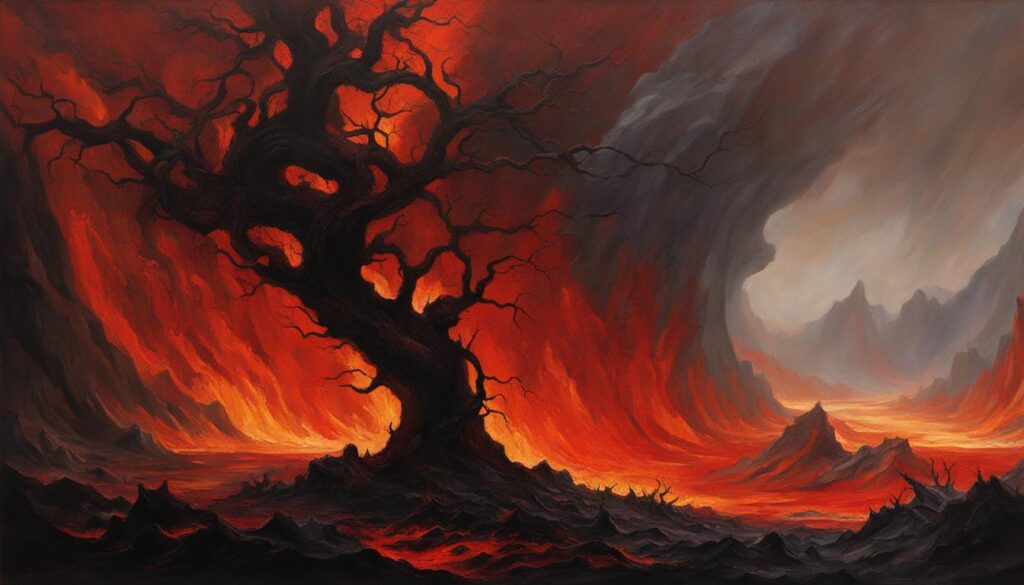
Similarities between Paradise Lost and Divine Comedy on Hell
In both Paradise Lost and Divine Comedy, the concept of Hell is explored in depth, revealing intriguing similarities in the themes of sin and punishment, the exploration of the nature of evil, and the potential for redemption. Both works delve into the consequences of disobedience and the temptation to defy the will of a higher power. Through their respective narratives, John Milton and Dante Alighieri offer profound insights into the underworld and its significance within the broader literary and theological traditions.
In both Paradise Lost and Divine Comedy, the punishments inflicted in Hell reflect the nature of the sins committed by its inhabitants. This portrayal creates a vivid representation of the consequences that await those who engage in sinful acts. The exploration of sin and its ramifications serves as a cautionary tale, emphasizing the importance of moral choices and personal responsibility.
Furthermore, both works delve into the nature of evil and its seductive allure. Paradise Lost showcases Satan’s rebellion against God and his role in corrupting Adam and Eve, while Divine Comedy presents a multitude of sinners who have succumbed to the temptations of their earthly desires. Both narratives explore the devastating impact of evil on individuals and society, offering thought-provoking insights into the complexities of human nature.
Table: Similarities between Paradise Lost and Divine Comedy
| Paradise Lost | Divine Comedy |
|---|---|
| Explores the consequences of disobedience | Emphasizes the importance of moral choices |
| Portrays punishment in Hell based on the nature of sins | Illuminates the ramifications of sinful acts |
| Examines the seductive nature of evil | Explores the devastating impact of evil |
| Explores themes of sin, punishment, and redemption | Offers insights into the complexities of human nature |
In conclusion, Paradise Lost and Divine Comedy share significant similarities in their exploration of Hell. Both works offer compelling narratives that delve into the themes of sin, punishment, the nature of evil, and the potential for redemption. Through their powerful storytelling and vivid descriptions, John Milton and Dante Alighieri provide readers with valuable insights into the complexities of the human condition and the profound consequences of our choices.
Differences between Paradise Lost and Divine Comedy on Hell
Paradise Lost and Divine Comedy approach the concept of Hell from distinct perspectives, resulting in notable differences in their narrative structure and thematic focus. While Paradise Lost centers around the biblical story of creation and the fall of Adam and Eve, Divine Comedy takes readers on a personal journey through Hell, Purgatory, and Paradise.
In Paradise Lost, John Milton delves into theological themes and explores the consequences of Satan’s rebellion and the temptation of Adam and Eve. The narrative unfolds on a grand scale, with a focus on biblical events and the cosmic struggle between good and evil. Milton’s epic poem provides an intricate examination of the nature of evil and the choices that lead to damnation.
Dante’s Divine Comedy, on the other hand, follows the protagonist’s personal journey through various circles of Hell, Purgatory, and ultimately, Paradise. The poem offers a more intimate exploration of sin and redemption, as Dante encounters different sinners and experiences their punishments firsthand. The focus is on individual experiences and the moral choices one faces, resulting in a poignant portrayal of the human condition.
Table: Comparing the Narrative Structure and Focus
| Paradise Lost | Divine Comedy | |
|---|---|---|
| Narrative Structure | Epic poem | Personal journey |
| Focus | Biblical story of creation and the fall of Adam and Eve | Individual experiences and moral choices |
| Thematic Emphasis | Theological implications and the nature of evil | Sin, redemption, and the human condition |
These contrasting approaches to Hell result in unique interpretations and themes explored in Paradise Lost and Divine Comedy. While Paradise Lost offers a broad examination of theological concepts, Divine Comedy delves into the individual’s struggle with sin and the potential for redemption. Both works contribute to our understanding of Hell in literature and offer insightful perspectives on the human experience.
Literary Analysis of Paradise Lost on Hell
Paradise Lost, written by John Milton, is widely regarded as one of the greatest works of English literature. The epic poem delves into the concepts of sin, punishment, and redemption, presenting a profound exploration of the nature of evil. Through its rich symbolism and allegory, Paradise Lost invites readers to contemplate the complexities of human choices and their moral consequences.
The use of symbolism in Paradise Lost is particularly notable in its depiction of Hell. Milton’s portrayal of the fallen angels and their punishment serves as a powerful metaphor for the consequences of rebellion and the corrupting influence of evil. The vivid descriptions of Hell’s torments and the suffering endured by its inhabitants emphasize the gravity of sin and the importance of divine justice.
Furthermore, Paradise Lost delves into various theological themes, further enriching its exploration of Hell. The poem grapples with the concept of free will and the inherent choices and responsibilities that come with it. It presents a nuanced understanding of sin, highlighting the intricate interplay between human agency, temptation, and redemption.
| Symbolism in Paradise Lost | Theological Themes | Exploration of Evil |
|---|---|---|
| Through vivid imagery and powerful language, Milton employs symbolism to convey profound ideas about the nature of evil and its consequences. | The poem grapples with theological concepts such as free will, divine justice, and the potential for redemption. | Paradise Lost offers a deep exploration of the complexities of evil, questioning the motivations behind immoral actions and their implications. |
| Milton’s use of symbolism adds depth and layers of meaning to the poem, encouraging readers to engage with its allegorical nature. | The theological themes in Paradise Lost provoke thoughtful analysis of the moral choices individuals face and the consequences that follow. | The exploration of evil in Paradise Lost prompts reflection on the nature of sin and the potential for redemption. |
In conclusion, Paradise Lost presents a captivating literary analysis of Hell that incorporates rich symbolism, theological themes, and a thought-provoking exploration of the nature of evil. Milton’s masterful use of language and his ability to delve into the complexities of human choices and their consequences make Paradise Lost a timeless work that continues to captivate readers to this day.
Literary Analysis of Divine Comedy on Hell
The Divine Comedy, written by Dante Alighieri, is a masterpiece of literature that presents a rich tapestry of symbolism and allegory in its exploration of sin and redemption. Through the protagonist’s personal journey through Hell, the poem delves into profound themes and offers thought-provoking insights. Dante’s vivid descriptions and encounters with various sinners create a captivating narrative that serves as a powerful reflection on the consequences of one’s actions.
In the Divine Comedy, symbolism plays a significant role in conveying deeper meanings. The various circles of Hell represent different sins and their corresponding punishments, creating a complex moral landscape. Through allegorical characters and events, Dante brings to life the consequences of sin and the potential for redemption. This use of symbolism enhances the overall literary experience and invites readers to contemplate their own moral choices.
Personal journey and exploration of sin and redemption
One of the unique aspects of the Divine Comedy is its focus on the protagonist’s personal journey through Hell, Purgatory, and Paradise. This intimate perspective allows for a deeper exploration of sin and redemption on an individual level. As Dante encounters different sinners and witnesses their sufferings, he reflects on the nature of sin and grapples with his own salvation. This personal journey adds a layer of emotional depth to the poem and provides readers with a relatable and introspective narrative.
Through the literary analysis of the Divine Comedy, we gain a greater appreciation for the profound themes and artistic techniques employed by Dante. The use of symbolism and allegory in the portrayal of Hell enhances the overall reading experience and prompts readers to reflect on their own moral choices. The personal journey of the protagonist adds emotional depth and serves as a powerful exploration of sin and redemption. The Divine Comedy stands as a timeless masterpiece that continues to captivate readers and provoke thoughtful analysis.
Comparing Paradise Lost and Divine Comedy
When examining the works of John Milton’s Paradise Lost and Dante Alighieri’s Divine Comedy, it becomes evident that both literary masterpieces offer unique perspectives on the concept of Hell. While Paradise Lost focuses on the biblical story of creation and the fall of Adam and Eve, Divine Comedy presents a personal journey through Hell, Purgatory, and Paradise. Although the narrative structures differ, both works explore theological themes and delve into the exploration of sin and redemption.
Similarities in Narrative Structure
In terms of narrative structure, Paradise Lost and Divine Comedy differ greatly. Paradise Lost follows a linear storyline, recounting the fall of Satan, the temptation of Adam and Eve, and the subsequent consequences. On the other hand, Divine Comedy takes the reader on a more complex journey through Hell, Purgatory, and Paradise. Despite these differences, both works share the commonality of exploring the consequences of sin and the possibility of redemption.
Theological Themes
Both Paradise Lost and Divine Comedy delve into theological themes, albeit in different ways. Paradise Lost highlights the nature of evil, the choices that lead to damnation, and the eventual redemption of mankind through the sacrifice of the Son. Divine Comedy emphasizes divine justice, the consequences of sin, and the potential for salvation. Both works offer profound insights into the moral and theological implications of Hell.
| Paradise Lost | Divine Comedy |
|---|---|
| Focuses on the biblical story of creation and the fall of Adam and Eve | Recounts a personal journey through Hell, Purgatory, and Paradise |
| Explores the nature of evil and the consequences of disobedience | Examines the moral choices faced by individuals and the potential for salvation |
| Offers a grand narrative with theological undertones | Incorporates symbolism and allegory to convey deeper meanings |
Through a comparison of Paradise Lost and Divine Comedy, readers gain valuable insights into the cultural and theological contexts in which these works were written. While Paradise Lost focuses on the biblical narrative and explores theological themes within a linear structure, Divine Comedy takes a more personal approach, delving into the individual experiences of sin, punishment, and potential redemption. Both works offer profound interpretations of Hell and its implications, inviting readers to reflect on the nature of evil and the choices that ultimately shape their own destinies.
Conclusion
In conclusion, there are stark differences in the interpretations of Hell and its implications between Paradise Lost and Divine Comedy. John Milton’s Paradise Lost focuses on the biblical story of creation and the fall of Adam and Eve, exploring themes of sin, punishment, and redemption within a grand narrative. On the other hand, Dante Alighieri’s Divine Comedy takes the reader on a personal journey through Hell, Purgatory, and Paradise, providing profound insights into the individual experiences of sin and the potential for salvation.
The stark difference lies in the narrative structure and focus of the two works. While Paradise Lost delves into the theological themes of the biblical narrative, Divine Comedy takes a more personal approach, exploring the moral choices and individual journey of the protagonist. These distinct interpretations of the underworld contribute to our understanding of the broader literary and theological traditions surrounding Hell.
Overall, both Paradise Lost and Divine Comedy offer valuable perspectives on the nature of Hell and its significance. Despite their differences, they shed light on the themes of sin, punishment, and redemption, providing readers with thought-provoking insights into the complexities of the underworld.
FAQ
What is the difference between Paradise Lost and Divine Comedy in their depiction of Hell?
Paradise Lost focuses on the biblical story of creation and the fall of Adam and Eve, while Divine Comedy takes the reader on a personal journey through Hell, Purgatory, and Paradise.
What is the overview of Paradise Lost?
Paradise Lost is a poem written by John Milton that retells the biblical story of creation and the fall of Adam and Eve, exploring themes of sin, punishment, and redemption.
What is the overview of Divine Comedy?
Divine Comedy is an epic poem written by Dante Alighieri that follows the protagonist’s journey through Hell, Purgatory, and Paradise, depicting various circles of Hell and exploring themes of sin, redemption, and divine justice.
How is Hell depicted in Paradise Lost?
Hell in Paradise Lost is portrayed as the realm of Satan and his rebel angels after their fall from Heaven. The punishments in Hell reflect the nature of the sins committed by its inhabitants, while the eventual redemption of mankind offers hope in the face of damnation.
How is Hell depicted in Divine Comedy?
Hell in Divine Comedy is depicted as a series of concentric circles, each representing a different sin and its corresponding punishment. Dante encounters various sinners in each circle and witnesses their sufferings, highlighting the consequences of sin and the justice of God.
What are the similarities between Paradise Lost and Divine Comedy in their portrayal of Hell?
Both works explore themes of sin, punishment, and redemption. They delve into the nature of evil, the consequences of disobedience, and the possibility of salvation.
What are the differences between Paradise Lost and Divine Comedy in their depiction of Hell?
Paradise Lost focuses on the biblical story of creation and the fall of Adam and Eve, while Divine Comedy follows the personal journey of the protagonist. The narrative structures and focuses result in unique interpretations of Hell and its implications.
What is the literary analysis of Paradise Lost’s portrayal of Hell?
Paradise Lost employs symbolism and allegory to explore theological themes and the nature of evil. Milton’s vivid descriptions and powerful language provoke thought on Hell and its implications.
What is the literary analysis of Divine Comedy’s portrayal of Hell?
Divine Comedy combines symbolism and allegory to explore the personal journey of the protagonist through Hell and his quest for redemption. It offers profound insights into the nature of sin and the potential for salvation.
How do John Milton’s Paradise Lost and Dante’s Divine Comedy compare in their depiction of Hell?
Comparing Paradise Lost and Divine Comedy provides valuable insights into the cultural and theological contexts in which they were written. Both works contribute to our understanding of the underworld and its significance within literature and theology.
 Skip to main content
Skip to main content